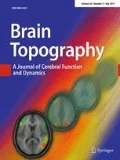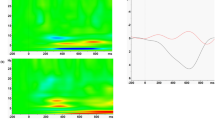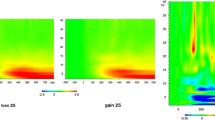Abstract
Several studies using electroencephalography (EEG) demonstrate that the processing of feedback in patients suffering from borderline personality disorder (BPD) is altered in comparison to healthy controls. Differences occur in the theta (ca. 5 Hz) and high-beta frequency-ranges (ca. 20 Hz) of oscillations in response to negative and positive feedback, respectively. However, alpha (ca. 10 Hz) and low-beta (ca. 15 Hz) oscillations have also been shown to be involved in feedback processing. We hypothesized that additional alterations might occur in these frequency ranges in BPD. Eighteen patients with BPD and twenty-two healthy controls performed a gambling task while 64-channel-EEG was recorded. Induced oscillatory responses to positive (i.e. gain) and negative (i.e. loss) feedback in the alpha and low-beta frequency range were investigated. No significant differences were found in the alpha frequency range. Regarding the low-beta frequency range a significant Group (i.e. BPD vs. healthy controls) × Valence (i.e. gain vs. loss) interaction in the time frame between 600 and 700 milliseconds after feedback was found. This effect showed a significant correlation with symptom severity (assessed with the BSL-23). The results indicate that feedback processing in BPD could be more heavily altered than previously expected, with more severe symptomatology being linked to stronger alterations in oscillatory responses to feedback in the low-beta range.





Similar content being viewed by others
References
Andreou C, Kleinert J, Steinmann S, Fuger U, Leicht G, Mulert C (2015) Oscillatory responses to reward processing in borderline personality disorder. World J Biol Psychiatry 16:575–586. https://doi.org/10.3109/15622975.2015.1054880
Andreou C et al (2017) Theta and high-beta networks for feedback processing: a simultaneous EEG-fMRI study in healthy male subjects. Transl Psychiatry 7:e1016. https://doi.org/10.1038/tp.2016.287
Ball JS, Links PS (2009) Borderline personality disorder and childhood trauma: evidence for a causal relationship. Curr Psychiatry Rep 11:63–68
Bandelow B, Schmahl C, Falkai P, Wedekind D (2010) Borderline personality disorder: a dysregulation of the endogenous opioid system? Psychol Rev 117:623–636. https://doi.org/10.1037/a0018095
Bluschke A, Roessner V, Beste C (2016) Editorial perspective: how to optimise frequency band neurofeedback for ADHD. J Child Psychol Psychiatry 57:457–461. https://doi.org/10.1111/jcpp.12521
Bohus M, Limberger MF, Frank U, Chapman AL, Kuhler T, Stieglitz RD (2007) Psychometric properties of the borderline symptom list (BSL). Psychopathology 40:126–132. https://doi.org/10.1159/000098493
Bohus M et al (2009) The short version of the borderline symptom list (BSL-23): development and initial data on psychometric properties. Psychopathology 42:32–39
Cross CP, Cyrenne DL, Brown GR (2013) Sex differences in sensation-seeking: a meta-analysis. Sci Rep 3:2486. https://doi.org/10.1038/srep02486
Delgado MR, Nystrom LE, Fissell C, Noll DC, Fiez JA (2000) Tracking the hemodynamic responses to reward and punishment in the striatum. J Neurophysiol 84:3072–3077. https://doi.org/10.1152/jn.2000.84.6.3072
Fuchs M, Kastner J, Wagner M, Hawes S, Ebersole JS (2002) A standardized boundary element method volume conductor model. Clin Neurophysiol 113:702–712
Gehring WJ, Willoughby AR (2002) The medial frontal cortex and the rapid processing of monetary gains and losses. Science 295:2279–2282. https://doi.org/10.1126/science.1066893
Grant BF et al (2008) Prevalence, correlates, disability, and comorbidity of DSM-IV borderline personality disorder: results from the wave 2 National Epidemiologic Survey on alcohol and related conditions. J Clin Psychiatry 69:533–545
Hajihosseini A, Holroyd CB (2013) Frontal midline theta and N200 amplitude reflect complementary information about expectancy and outcome evaluation. Psychophysiology 50:550–562. https://doi.org/10.1111/psyp.12040
HajiHosseini A, Rodriguez-Fornells A, Marco-Pallares J (2012) The role of beta-gamma oscillations in unexpected rewards processing. Neuroimage 60:1678–1685. https://doi.org/10.1016/j.neuroimage.2012.01.125
Hauser TU, Hunt LT, Iannaccone R, Walitza S, Brandeis D, Brem S, Dolan RJ (2015) Temporally dissociable contributions of human medial prefrontal subregions to reward-guided. Learn J Neurosci 35:11209–11220. https://doi.org/10.1523/JNEUROSCI.0560-15.2015
Heinrich H, Busch K, Studer P, Erbe K, Moll GH, Kratz O (2014) EEG spectral analysis of attention in ADHD: implications for neurofeedback training? Front Hum Neurosci 8:611. https://doi.org/10.3389/fnhum.2014.00611
Herman JL, Perry C, Van der Kolk BA (1989) Childhood trauma in borderline personality disorder. Am J Psychiatry 146:490
Holroyd CB, Coles MGH (2002) The neural basis of human error processing: reinforcement learning, dopamine, and the error-related negativity. Psychol Rev 109:679–709. https://doi.org/10.1037/0033-295X.109.4.679
Kjaer J, Biskin R, Vestergaard C, Munk-Jørgensen P (2015) A nationwide study of mortality in patients with borderline personality disorder. Eur Psychiatry 30:202
Knutson B, Adams CM, Fong GW, Hommer D (2001) Anticipation of increasing monetary reward selectively recruits nucleus accumbens. J Neurosci 21:RC159
Lancaster JL et al (2000) Automated Talairach atlas labels for functional brain mapping. Hum Brain Mapp 10:120–131
Lee SH, Park Y, Jin MJ, Lee YJ, Hahn SW (2017) Childhood trauma associated with enhanced high frequency band powers and induced subjective inattention of adults. Front Behav Neurosci 11:148. https://doi.org/10.3389/fnbeh.2017.00148
Leicht G, Troschutz S, Andreou C, Karamatskos E, Ertl M, Naber D, Mulert C (2013) Relationship between oscillatory neuronal activity during reward processing and trait impulsivity and sensation seeking. PLoS ONE 8:e83414. https://doi.org/10.1371/journal.pone.0083414
Lenzenweger MF, Lane MC, Loranger AW, Kessler RC (2007) DSM-IV personality disorders in the National Comorbidity Survey. Replication Biol Psychiatry 62:553–564. https://doi.org/10.1016/j.biopsych.2006.09.019
Marco-Pallares J, Cucurell D, Cunillera T, Garcia R, Andres-Pueyo A, Munte TF, Rodriguez-Fornells A (2008) Human oscillatory activity associated to reward processing in a gambling task. Neuropsychologia 46:241–248. https://doi.org/10.1016/j.neuropsychologia.2007.07.016
Marin RS (1991) Apathy: a neuropsychiatric syndrome. J Neuropsychiatry Clin Neurosci 3:243–254. https://doi.org/10.1176/jnp.3.3.243
Mazziotta J et al (2001) A probabilistic atlas and reference system for the human brain: International Consortium for Brain Mapping (ICBM). Philos Trans R Soc Lond B Biol Sci 356:1293–1322. https://doi.org/10.1098/rstb.2001.0915
Mobascher A et al (2009) Fluctuations in electrodermal activity reveal variations in single trial brain responses to painful laser stimuli–a fMRI/. EEG Study Neuroimage 44:1081–1092. https://doi.org/10.1016/j.neuroimage.2008.09.004
Montgomery SA, Åsberg M (1979) A new depression scale designed to be sensitive to change. Br J Psychiatry 134:382–389
Morey RD (2008) Confidence intervals from normalized data: a correction to Cousineau (2005). Reason 4:61–64
Mulert C et al (2004) Integration of fMRI and simultaneous EEG: towards a comprehensive understanding of localization and time-course of brain activity in target detection. Neuroimage 22:83–94. https://doi.org/10.1016/j.neuroimage.2003.10.051
Nieuwenhuis S, Slagter HA, von Geusau NJ, Heslenfeld DJ, Holroyd CB (2005) Knowing good from bad: differential activation of human cortical areas by positive and negative outcomes. Eur J Neurosci 21:3161–3168. https://doi.org/10.1111/j.1460-9568.2005.04152.x
Olbrich S, Mulert C, Karch S, Trenner M, Leicht G, Pogarell O, Hegerl U (2009) EEG-vigilance and BOLD effect during simultaneous EEG/fMRI measurement. Neuroimage 45:319–332. https://doi.org/10.1016/j.neuroimage.2008.11.014
Paret C, Hoesterey S, Kleindienst N, Schmahl C (2016) Associations of emotional arousal, dissociation and symptom severity with operant conditioning in borderline personality disorder. Psychiatry Res 244:194–201. https://doi.org/10.1016/j.psychres.2016.07.054
Pascual-Marqui RD (2002) Standardized low-resolution brain electromagnetic tomography (sLORETA): technical details. Methods Find Exp Clin Pharmacol 24 Suppl D:5–12
Peters JR, Upton BT, Baer RA (2013) Brief report: relationships between facets of impulsivity and borderline personality features. J Pers Disord 27:547–552. https://doi.org/10.1521/pedi_2012_26_044
Philipsen A et al (2009) Borderline typical symptoms in adult patients with attention deficit/hyperactivity disorder. Atten Defic Hyperact Disord 1:11–18. https://doi.org/10.1007/s12402-009-0001-7
Pornpattananangkul N, Nusslock R (2016) Willing to wait: elevated reward-processing EEG activity associated with a greater preference for larger-but-delayed rewards. Neuropsychologia 91:141–162. https://doi.org/10.1016/j.neuropsychologia.2016.07.037
Schuermann B, Kathmann N, Stiglmayr C, Renneberg B, Endrass T (2011) Impaired decision making and feedback evaluation in borderline personality disorder. Psychol Med 41:1917–1927. https://doi.org/10.1017/S003329171000262X
Schultz W (2006) Behavioral theories and the neurophysiology of reward. Annu Rev Psychol 57:87–115. https://doi.org/10.1146/annurev.psych.56.091103.070229
Sheehan D et al (1998) The Mini-International Neuropsychiatric Interview (MINI): the development and validation of a structured diagnostic psychiatric interview for DSM-IV and ICD-10. J Clin Psychiatry 59:22
Stiglmayr CE, Shapiro DA, Stieglitz RD, Limberger MF, Bohus M (2001) Experience of aversive tension and dissociation in female patients with borderline personality disorder—a controlled study. J Psychiatr Res 35:111–118
Taber KH, Black DN, Porrino LJ, Hurley RA (2012) Neuroanatomy of dopamine: reward and addiction. J Neuropsychiatry Clin Neurosci 24:1–4. https://doi.org/10.1176/appi.neuropsych.24.1.1
Threadgill AH, Gable PA (2018) Resting beta activation and trait motivation: neurophysiological markers of motivated motor-action preparation. Int J Psychophysiol 127:46–51. https://doi.org/10.1016/j.ijpsycho.2018.03.002
van Asselt AD, Dirksen CD, Arntz A, Severens JL (2007) The cost of borderline personality disorder: societal cost of illness in BPD-patients. Eur Psychiatry 22:354–361. https://doi.org/10.1016/j.eurpsy.2007.04.001
Vega D, Soto A, Amengual JL, Ribas J, Torrubia R, Rodriguez-Fornells A, Marco-Pallares J (2013) Negative reward expectations in borderline personality disorder patients: neurophysiological evidence. Biol Psychol 94:388–396. https://doi.org/10.1016/j.biopsycho.2013.08.002
Volkow ND, Wang GJ, Fowler JS, Tomasi D, Telang F (2011) Addiction: beyond dopamine reward circuitry. Proc Natl Acad Sci USA 108:15037–15042. https://doi.org/10.1073/pnas.1010654108
Wittchen H, Zaudig M, Fydrich T (1997) Structured clinical interview for DSM-IV. Hogrefe, Göttingen
Yaple Z, Martinez-Saito M, Novikov NA, Altukhov D, Shestakova A, Klucharev V (2018) Power of feedback-induced beta oscillations reflect omission of rewards: evidence from an EEG gambling study. Front Neurosci 12:776
Acknowledgements
Parts of this work were prepared in the context of P Schauers doctoral dissertation at the Faculty of Medicine, University of Hamburg, Germany. Special thanks to Julia Kleinert for her preparatory work.
Author information
Authors and Affiliations
Corresponding author
Additional information
Handling Editor: Christoph M. Michel.
Publisher’s Note
Springer Nature remains neutral with regard to jurisdictional claims in published maps and institutional affiliations.
Paul Alexander Schauer and Jonas Rauh share first authorship, whilst Christina Andreou and Christoph Mulert share last authorship.
Rights and permissions
About this article
Cite this article
Schauer, P.A., Rauh, J., Leicht, G. et al. Altered Oscillatory Responses to Feedback in Borderline Personality Disorder are Linked to Symptom Severity. Brain Topogr 32, 482–491 (2019). https://doi.org/10.1007/s10548-019-00700-4
Received:
Accepted:
Published:
Issue Date:
DOI: https://doi.org/10.1007/s10548-019-00700-4




